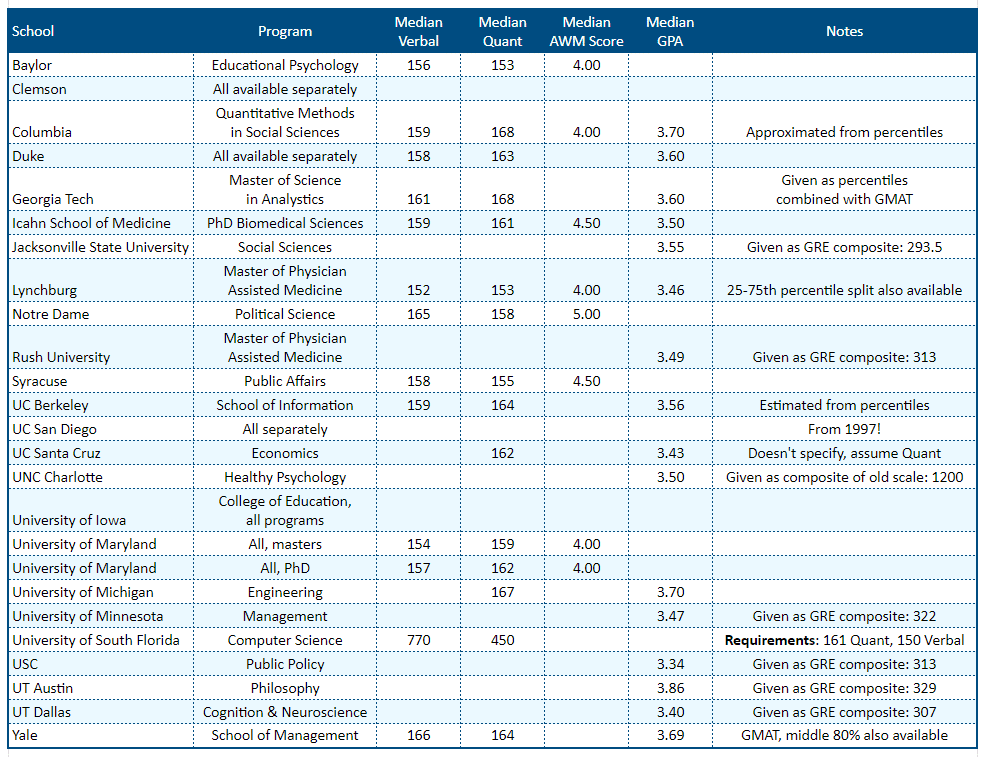Why is it So Hard to Get a Straight Answer?
When you begin to prepare for the GRE, you’re probably asking yourself. What score do I need? The answer you are likely to encounter is: “it depends,” “call the school,” “there is not required score”. These do very letter so assuage doubts or help you prepare effectively for the exam.
In fact, schools are more forthcoming about median GPA scores for admitted applicants than they are about GRE scores. You need to look no further than the US News’ Graduate School Rankings! The median GRE score for the majority of programs is not available. Of course, there are exceptions. GRE information is widely available and published for Education (Verbal and Quant) and Engineering programs (Quant only). But, if your interest falls outside these and a couple other specialties, transparency becomes the exception rather than the norm.
What’s a Student to Do?
You relentlessly prepare, get a score, and have little idea whether it’s great, good enough, or a liability. Your first reaction may have you looking at the percentiles that correspond to your Verbal, Quant, and Analytical Writing scores. However, these percentiles are for all test-takers by intended field of study, not percentiles for admitted applicants. Take this analogous example. While the average LSAT score could be around 151, the median score of admitted applicants at Yale is 173. The median LSAT score at Yale Law is a 99th percentile score!
There is, however, a significant difference between grad school admissions and medical, law, or business school admissions. The grad school admissions process tends to be more holistic. In other words, most graduate programs tend to emphasize assessments of applications in their entirety. This means they don’t necessarily have cut-off scores.
That being said, as the GRE gains more prominence in business and law admissions, students will rightly want to know how their GRE score measures up against comparable GMAT or LSAT score. Both have greater weight in their respective admissions processes. There is also far greater transparency in released scores. For instance, the majority of business schools release information about the GMAT scores of admitted/matriculated students. Very few also release similar information about GRE scores, even though they all accept the GRE and claim it’s viewed no more or less favorably than the GMAT. In addition, even if a graduate department equivocates about the importance of GRE scores, this reticence may only aggravate students’ concerns. Applicants to these programs may feel as though they are “flying blind.”
Unfortunately, we cannot provide statistics that are not available. But we do have a little something for you to consider. We’ve compiled information from 25 business and graduate programs that release information about the GRE scores of admitted applicants.
Below is a snapshot of this information. For a more interactive format, here is a direct download link to the file.
The Raw Data on GRE Scores
How to Use This Information
Clearly, the data above is merely from a cross-section of both schools and specific programs within these universities. Because of this, you cannot use this information to make hard and fast decisions about whether you qualify for a specific program.
When you compare the programs above to similar programs you’re looking at, you may get a clearer picture of how your application stacks up against your peers. For example, let’s assume you want to attend NYU for a masters in Public Policy. You might note that this top ten program is likely similar to USC’s Price program. The GRE information above shows they typically accept a composite median score of 313. While this will not answer all your questions, it can give you a rough estimate of how you compare to similar students.
Let’s now assume you’re a prospective business or law school applicants submitting a GRE score with your application. One good way to assess the strength of your GRE score is to measure GRE percentiles against GMAT or LSAT percentiles. Full percentile breakdowns are available from ETS, the GMAC, and the LSAC:
- GRE Guide to the Use of Scores – ETS
- What Your GMAT Percentile Ranking Means – GMAC
- The LSAT Scoring Scale Explained – PowerScore
Example A:
If you are an applicant to UMass Amherst’s MBA program, you could start by noting that the median GMAT score for admitted applicants is 639. On the GMAT scale, this places the median around the 69th percentile. On the GRE scale, a 69th percentile Verbal score is around 155 and a 69th percentile Quant score is around 158. To be conservative and cautious, if submitting a GRE score, you might shoot for a minimum 75th percentile score in each GRE Verbal and Quant.
- 75th percentile GRE Verbal: 157
- 75th percentile GRE Quant: 160
Example B:
If you are an applicant to Northwestern Law School, the reported 25th to 75th percentile LSAT score range for admitted applicants is 163-170. Since you are submitting an application with a GRE score instead of an LSAT score, to be safe you might want to shoot for scores comparable to the 75th percentile LSAT score of admitted applicants. A 170 on the LSAT places students in the 97th percentile. On the GRE scale, a 97th percentile Verbal score is 166 and a 97th percentile Quant core is 170, a perfect score.
- 97th percentile GRE Verbal: 166
- 97th percentile GRE Quant: 170
Just the Beginning
This data may raise more questions than they answer for you. We hope that if you are equipped with more facts you will be able to make more informed decisions or at least ask university admissions officers the right questions. For all GRE students, an excellent initial step towards success is to reach out to programs you’re interested in to ascertain what role the GRE plays in admissions. As you have likely observed, the GRE can range from a procedural afterthought to a crucial metric depending on the program.




Leave a Reply
You must be logged in to post a comment.